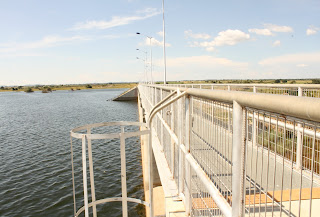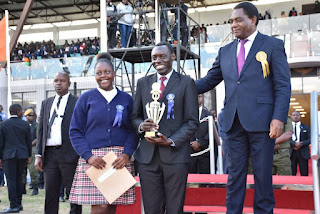Mwomboshi Dam Game-Changer
By Linda Mupemo
Chileleko Choolwe had not spared his sweat cultivating maize this farming season. It was never obvious that the lack of adequate rains would be his worst enemy.
It is now March and clouds of gloom surround Mr. Choolwe; drying and dying crops.
He stands by his maize field staring at his near lifeless crops. As he touches their crispy leaves, thoughts of a poor harvest race restlessly through his mind.
“My crops are stunted and drying up; I am worried about my harvest. Moreover, I do not have money to buy more farming inputs for replanting,” he laments.
Mr. Choolwe is one of the farmers practicing rain-fed agriculture in Chisamba District in Central Province who are grappling with crop failure owing to the poor rainfall pattern.
Since the onset of the 2023/2024 rainy season, the climatic condition of the area has been punctuated with dry spells, signifying adverse effects of climate change.
Most farmers in the area solely depend on agriculture to sustain themselves. Therefore, any disturbance in their agricultural activities, natural or man-made, spells doom.
Chisamba District Agriculture Crop Officer Naomi Njobvu says farmers in the district have lost 25 percent of their crops due to inadequate rains being recieved.
Ms. Njobvu reveals that the latest crop monitoring exercise conducted in Chisamba Central, Chamuka, Mwapula and Liteta Wards indicates that most of the maize plants are stressed.
“The situation is dire, even if it rains at this point, chances of the crops being rejuvenated are slim. The maize has already started tussling,” she says.
In October 2023, a Zambia Meteorology Department 2023/2024 rainfall forecast projected that the season will be characterised by normal to below normal rainfall over most parts of Zambia, periods of dry spells and episodes of heavy rainfall events.
"The El Nino climate phenomenon characterised by above average Sea Surface Temperatures (SSTs) in the Pacific Ocean is expected to persist and influence Zambia's rainfall pattern during the 2023/2024 season. This condition will reduce rainfall in Zambia," Meteorology Director Edson Nkonde said.
However, not all hope is lost as some farmers are irrigating their crops using water from the US $ 49 million Mwomboshi Dam.
The World Bank funded project which was commissioned in 2018 has a 1,700-meter-long wall and is 23 meters high. Additionally, it has capacity to hold 65 million cubic liters of water which can be irrigated over 4, 000 hectares, making it the biggest irrigation dam in the country.
Government through the Irrigation Development Support Project (IDSP) established the Mwomboshi Community Land Trust (CLT) which handles land administration matters at the irrigation scheme.
Mwomboshi CLT Chairperson John Foto says the 760 households that resided in the area when the project commenced consolidated over 4,500 hectares of their land in Chief Liteta’s chiefdom and converted it into a one state-owned farming enterprise.
He notes that the availability of abundant water has improved agricultural productivity in Mwomboshi.
Noteworthy is that water is an essential element in agriculture hence the poor rains have led to its scarcity, thereby negatively affecting agricultural production.
But with the irrigation infrastructure in place in Mwomboshi, beneficiary farmers have been cushioned against the shocks of climate change.
Mr. Foto discloses that the irrigation scheme is subdivided into three cohorts of farmers namely tier one, tier two and tier three.
Tier one farmers comprise small scale farmers who were early settlers in Mwomboshi and were displaced to pave way for the irrigation infrastructure. These were compensated and relocated to upper land where Government constructed three-bedroom-houses for each household.
The farmers were also given farm land within the scheme to enable them benefit from the dam which was constructed across the Mwomboshi river.
Tier two farmers, on the other hand, are emergent farmers who are not fully commercial, yet no longer subsistence farmers while tier three farmers are commercial farmers.
“The CLT has leased out land to the Zambia Correctional Services (ZCS) and Chomene investments. These entities grow a variety of crops using mechanised irrigation equipment such as center pivots and they tap water from the dam. This has contributed to the productive utilisation of land which was just lying idle,” Mr. Foto says.
Mr. Foto says shareholders of the scheme have ventured into contract farming to eradicate uncertainties of buyers of their produce.
“When it comes to crop farming, we grow crops we already have a market for such as Buya Bamba Limited. This is giving us a good return on our investments. All we have to do is focus on production to ensure we have high yields,” he explains.
Mr. Foto discloses that the community has future plans of constructing more infrastructure in the area such as tarred roads and health facilities using money raised through the lease of land.
Barrack Sikana, another small-scale farmer at Mwomboshi beamed with happiness as he said engaging in all-year-round agricultural activities has increased his level of income.
Mr. Sikana whose family comprises eight members says the development has additionally enhanced his family’s nutrition and food security.
“Previously, we only used to grow maize in the rainy season and had low household income. But with the construction of the Mwomboshi Dam, we are able to grow a variety of crops for home consumption and for commercial purposes throughout the year,” he says.
He says one of the crops tier one farmers have grown are potatoes and expect to harvest 600-kilogram bags per hectare.
The small-scale farmers at the scheme use drip irrigation to water their crops. This entails that water goes directly to the crop hence there is no wastage of the resource.
“I no longer have to worry about what my family will eat since we have food all year round. The dam is enabling me carry out farming activities with or without rains. I am thankful to Government for implementing this project,” Mr. Sikana says.
Chisamba District Commissioner Joel Mboyoma attests to the success of the Mwomboshi irrigation project.
Mr. Mboyoma notes that the dam has benefited both the locals and the country as a whole.
He states that agriculture is the main economic activity in Chisamba hence the construction of the dam has enabled the area become a food hub.
“Small scale and commercial farmers are utilising the facility. For instance, the Zambia Correctional Services (ZCS) has acquired 700 hectares of land which it uses to grow crops such as potatoes, onion, maize and watermelons. The produce is offloaded on the market thereby promoting food security in our region,” he said.
Mr. Mboyoma wants more farmers to venture into irrigation farming at the Mwomboshi dam so as to fully utilise the land within the scheme and the irrigation infrastructure.
Notable is that the water resource is equally supporting livestock and fish farming thus promoting agriculture diversification.
The heightened agricultural productivity is aiding beneficiary households meet their nutritional needs as envisioned by the United Nations (UN) in the Sustainable Development Goals (SDGs).
Part three of SDG number two reads, “ensure sustainable food production systems and implement resilient agricultural practices that increase productivity and production, that help maintain ecosystems, that strengthen capacity for adaption to climate change, extreme weather, drought, flooding and other disasters and that progressively improve land and soil quality.”
Chisamba District Agricultural Coordinator (DACO) Belvin Muntanga has urged farmers to embrace irrigation farming to counter the effects of poor and delayed rains.
Mr. Muntanga says the Mwomboshi Dam is an opportune infrastructure which is playing a vital role in promoting food security amid disrupted rainfall patterns.
“The current climatic condition calls for a mixture of rain-fed and irrigation farming. For farmers to be food secure and continue to generate income from their ventures, they need to adopt climate resilient strategies such as irrigation farming,” he says.
Suffice to say irrigation farming is the emancipator of food security given the present climatic conditions.
With the erratic rainfall patterns being experienced in most parts of the country, farmers can no longer exclusively rely on rain-fed agriculture.
It is anticipated that Government and its cooperating partners will replicate irrigation infrastructure projects such as the Mwomboshi Dam across the country to deter poor harvests and undernourishment being driven by inadequate rains.
This feature article was published in Zambia Daily Mail newspaper on 13th March, 2024.




Comments
Post a Comment